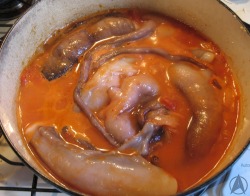Due to the high Klingon metabolism, eating and drinking are an important part of Klingon life next to fighting. A full Klingon meal may consist of between four and five dishes.
Klingons enjoy a variety of good food. Not all of it looks like piles of cold offal unceremonoously slapped onto the plate or eaten live and still squirming. Klingon food can be prepared a number of different ways, including coating in crumbs, soaking in a marinade, stewing or even partial fermentation. Some food is boiled or rendered, some frozen, and some recipes do actually call for the food to be deep-fried.

Typical Klingon meals include breakfast, lunch, dinner and the midnight snack - actually often a full meal unto itself.
| nIQ | breakfast |
| megh | lunch |
| 'uQ | dinner |
| 'uQ'a' | banquet, feast |
| ghem | midnight snack |
| nay' | dish, course |
The people who prepare food and drinks have a variety of different titles. The basic preparer of food, whether solid or liquid, is known as a vutwI'. Sometimes, a separate jabwI' server serves the food - the verb jab means to serve food (or drinks). A bartender who serves drinks in a bar is known as a chom. The place where each serves is called Qe' restaurant and tach bar, respectively.
Fast food exists in the Klingon Empire, known as moD Soj - literally the food hurries. Such a place, known as a Do Qe' velocity restaurant, does not have a vutwI' - instead, they have a tebwI', a (plate) filler.
| vutwI' | cook |
| jabwI' | server |
| chom | bartender |
| tebwI' | fast food worker |
| Qe' | restaurant |
| Do Qe' | fast food place |
| moD Soj | fast food |
Hapmey lI' Useful Substances
There are a number of useful substances which are used by Klingons in food preparation, but which themselves are not considered food. They are used as part of food preparation.
An example is 'atlhqam, a kind of fungus which is used to ferment various kinds of meat or vegetables. 'atlhqam is scraped (tey scrape) from trees, but it is also found between the toes of certain animals.
| 'atlhqam vIlo'bogh Ha'DIbaH vIrogh, 'ej vIwech | I ferment the meat with the fungus and serve it at its peak |
| 'atlhqam | type of fungus used to ferment food |
| rogh | ferment |
| wech | serve food at its peak |
Sometimes, living animals are used to process the food. A sauce called quD is produced by digesting a substance called Su'lop in the stomach of an animal; at its peak, the quD is cut out of the animal's belly and served with a flourish. The process is called Suqqa':-
| quD vISuqqa' | I obtain the quD |
In the absence of a suitable animal, the chef uses a vat and a mix of enzymes which digests the quD artificially - the result is called 'un quD pot quD, and while it is chemically identical to the naturally-produced burgh quD stomach quD Klingons would prefer the natural burgh quD when it is available.

Another common substance is ngat. This is a granulated cartilage mixed with a grain (tIr grain) and is typically coated over the food being prepared. The verb for this is pID. The closest translation for ngat is breadcrumbs, even though no actual breadcrumbs are used to make the ngat.
| ngat vIlo'bogh lIngta' gham vIpID | I I coat the lingta limb with breadcrumbs |
chanDoq is a very common Klingon food substance. chanDoq is a marinade. Every chef worth his salt has a stock of chanDoq. It could be said that each Klingon chef's chanDoq is different. Every Klingon chef guards the recipe for his chanDoq with ferocity. The process of soaking or drenching the food in the chanDoq is called HaH.
| chanDoq vIlo'bogh lIngta' gham vIHaH | I I steep the lingta limb in the marinade |
Sometimes, the chanDoq is thickened to form a chanDoq jeD thick chanDoq - this is served as a sauce. Other kinds of sauces include 'uSu', which is usually served in a jug as an accompaniment to gladst (tlhatlh 'uSu' bal means gladst with jug of 'uSu'), ghevI' which is the sauce in which qagh is usually served, and the concoction of animal blood, herbs and condiments in which some food is stewed - the verb to stew is Qev.

Next: More Klingon food.
No comments:
Post a Comment
DaH yIjatlh! Speak now!